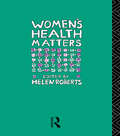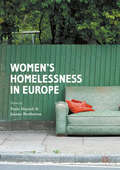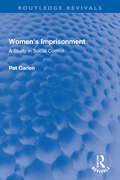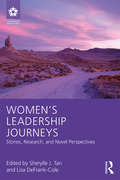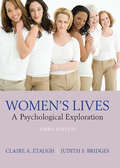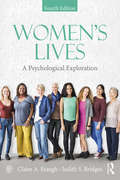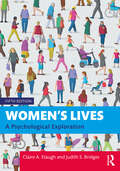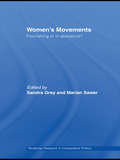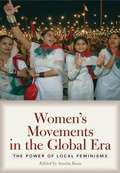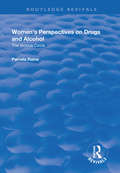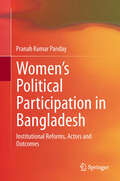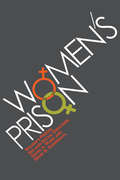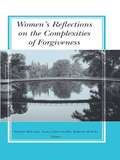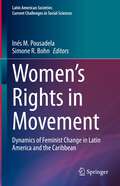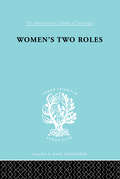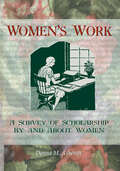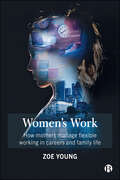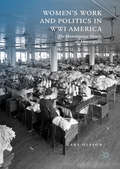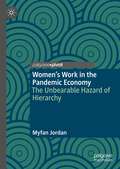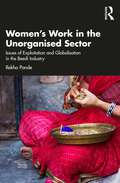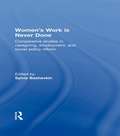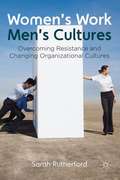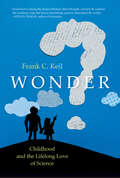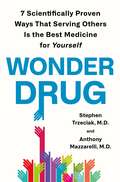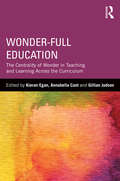- Table View
- List View
Women's Health Matters
by Helen RobertsWomen's Health Matters, like its sister volume Women's Health Counts, is an invaluable practical guide to doing feminist research on women's health. Written by experienced researchers and practitioners, these lively accounts of research work range from getting the research idea, through obtaining the funding and doing the research, to the practical problems faced, and eventual publication. The book provides an ideal antidote to textbooks and manuals, giving the reader a taste of the problems and pleasures of doing real research.
Women’s Homelessness in Europe
by Paula Mayock and Joanne BrethertonThis book marks a critical contribution in assessing and extending the evidence base on the causes and consequences of women’s homelessness. Drawing together work from Europe’s leading homelessness scholars, it presents a multidisciplinary and comparative analysis of this acute social problem, including its relationship with domestic violence, lone parenthood, motherhood, health and well-being and women’s experience of sustained and recurrent homelessness. Working from diverse perspectives, the authors look at the responses to women’s homelessness in differing cultures and regions, and within various forms of welfare states. They focus in particular on relating the gender dimensions of welfare and social policy to women’s experiences when they become homeless. This innovative and timely edited volume will appeal to students and scholars of sociology, social policy, anthropology, and gender and women’s studies, along with international policy-makers.
Women's Imprisonment: A Study in Social Control (Routledge Revivals)
by Pat CarlenFirst published in 1983, Women’s Imprisonment explores the meanings of women’s imprisonment and, in particular, the wider meanings of the ‘moment’ of prison. Based on officially sponsored research in Cornton Vale, Scotland’s only women’s prison, the book makes extensive use of interviews with sheriffs, policemen, and social workers, as well as observation in the prisons, the courts, and the lodging-houses. The author quotes from interviews with women recidivist prisoners, the judges who send them to prison, and the agencies which assist them in between their periods of imprisonment. In doing so, questions are raised about the meanings of imprisonment and the penal disciplining of women at the time of original publication. The book also examines the changing and various meanings of imprisonment in general and the invisible nature of the social control of women in particular.
Women's Leadership Journeys: Stories, Research, and Novel Perspectives (Leadership: Research and Practice)
by Sherylle J. Tan Lisa DeFrank-ColeThis volume brings together research from leading scholars with stories from women leaders in diverse sectors to provide insights from their leadership journeys. The book begins with personal stories of women’s leadership journeys by chief executive officers, a former U.S. ambassador, a college president, and others. The stories enable readers to make sense of their own leadership journeys by learning about the varied paths to leadership and taking note of key elements such as role transitions, defining moments, identity development, and growth mindsets. Next, scholars discuss novel research that can guide women in navigating their journeys to leadership, including on followership, competition, representation of women in politics, and the role of biology in leadership. This must-have volume offers cutting-edge perspectives and a guide for women to navigate their own journeys to impactful leadership.
Women's Lives: A Psychological Exploration
by Claire A. Etaugh Judith S. BridgesWomen’s Lives: A Psychological Exploration, 3rd Edition draws on a wealth of the literature to present a rich range of experiences and issues of relevance to girls and women. This text offers the unique combination of a chronological approach to gender that is embedded within topical chapters. Cutting-edge and comprehensive, each chapter integrates current material on women differing in age, ethnicity, social class, nationality, sexual orientation and ableness. The third edition reflects substantial changes in the field while maintaining its empirical focus through engaging writing, student activities, and critical thinking exercises. With over 2,100 new references emphasizing the latest research and theories, the authors continue to pique interests in psychology of women.
Women's Lives: A Psychological Exploration (4th Edition)
by Claire A. Etaugh Judith S. Bridges<p>This cutting-edge and comprehensive fourth edition of Women’s Lives: A Psychological Perspective integrates the most current research and social issues to explore the psychological diversity of girls and women varying in age, ethnicity, social class, nationality, sexual orientation, and ableness. Written in an engaging and accessible manner, its use of vignettes, quotes, and numerous pedagogical tools effectively fosters students’ engagement, active learning, critical thinking, and social activism. <p>New information covered includes: <p> <li>neoliberal feminism, standpoint theory, mujerista psychology (Chapter 1) <li>LGBT individuals and individuals with disabilities in media (Chapter 2) <li>testosterone testing of female athletes, precarious manhood (Chapter 3) <li>raising a gender non-conforming child, impact of social media on body image (Chapter 4) <li>gender differences in narcissism and Big Five personality traits, women video-game designers (Chapter 5) <li>asexuality, transgender individuals, sexual agency, "Viagra for women" controversy (Chapter 6) <li>adoption of frozen embryos controversy (Chapter 7) <li>intensive mothering, integrated motherhood, "living apart together", same-sex marriage (Chapter 8) <li>single-sex schooling controversy (Chapter 9) <li>combat roles opened to U.S. women, managerial derailment (Chapter 10) <li>work-hours dilemmas of low-wage workers (Chapter 11) <li>feminist health care model, health care for transgender individuals, Affordable Care Act (Chapter 12) <li>feminist critique of CDC guidelines on women and drinking (Chapter 13) <li>cyberharassment, gendertrolling, campus sexual assault (Chapter 14) <li>transnational feminism, men and feminism (Chapter 15)</li> <p> <p>Women’s Lives stands apart from other texts on the psychology of women because it embeds within each topical chapter a lifespan approach and robust coverage of the impact of social, cultural, and economic factors in shaping women’s lives around the world. It provides extensive information on women with disabilities, middle-aged and <p>Its up-to-date coverage reflects current scientific and social developments, including over 2,200 new references. This edition also adds several new boxed features for student engagement. In The News boxes present current, often controversial, news items to get students thinking critically about real-life applications of course topics. Get Involved boxes encourage students to actively participate in the research process. What You Can Do boxes give students applied activities to promote a more egalitarian society. Learn About the Research boxes expose students to a variety of research methods and highlight the importance of diversity in research samples by including studies of underrepresented groups.</p>
Women's Lives: A Psychological Exploration
by Claire A. Etaugh Judith S. BridgesWomen’s Lives integrates the most current research and social issues to explore the psychological diversity of girls and women varying in age, ethnicity, social class, nationality, immigrant experience, sexual orientation, gender identity, ableness and body size and shape. The text embeds a lifespan perspective within each topical chapter and has an intersectional approach that integrates women’s diverse identities. It includes rich coverage of women with disabilities and on middle-aged and older women throughout. Taking a deeper transnational focus, it also examines the impact of social, cultural, and economic factors in shaping women’s lives around the world. This edition explores the latest areas of research and tackles important contemporary topics such as: feminization of immigration media portrayals of LGBTQ individuals and immigrants regulating testosterone levels in women’s sports; disorders of sexual development; nonbinary identity the effects of social media on body image; sizeism new classification of sexual disorders menstrual equity and the "tampon tax" immigrant women as transnational mothers academic environment for low-income, ethnic minority, and immigrant women effects of the COVID-19 pandemic on women’s employment and work-family balance the dilemma of unpredictable work hours healthcare barriers experienced by immigrant women and LGBTQ individuals #MeToo movement; vigilante gender violence the fourth wave of feminism the role of immigrant women and ethinc minority women in grassroots feminist activism men’s support of feminist issues and more. Boasting a new full-color design and rich with pedagogy, the book includes several boxed elements in each chapter. "In The News" boxes present current news items designed to engage students in thinking critically about current gender-focused events and issues. The "What You Can Do" boxes give students examples of applied activities that they can engage in to promote a more egalitarian society. "Get Involved" boxes ask students to collect data and to critically think about the explanations and implications of the activity’s findings. "Learn About the Research" boxes expose students to a variety of research methods and highlight the importance of diversity in research samples by including studies of underrepresented groups. At the end of each chapter, "What Do You Think" questions foster skills in critical thinking, synthesis, and evaluation by asking the student to apply course material or personal experiences to provocative issues from the chapter. The "If You Want to Learn More" feature provides names of the most current books available on various topics that are discussed in the chapter. Combining up-to-date research with an approachable and engaging writing style, Women’s Lives is an invaluable resource for all students of gender from psychology, women’s studies, gender studies, sociology, and anthropology.
Women's Movements: Flourishing or in abeyance? (Routledge Research in Comparative Politics)
by Sandra Grey Marian SawerWritten by leading women's movement scholars, this book is the first to systematically apply the idea of social movement abeyance to differing national and international contexts. Its starting point is the idea that the women's movement is over, an idea promoted in the media and encouraged by scholarship that regards disruptive action as a defining element of social movements. It goes on to compare the trajectories over the past 40 years of women's movements in Australia, Canada, Japan, Korea, New Zealand, the United Kingdom and the United States. Finally, it looks at the extension of feminist activism into supranational and subnational institutions—the global and the local—and into cyberspace. Comparing these diverse sites of political and social action illuminates some of the major opportunities and constraints that have impacted upon women’s movements. It advances our understanding of the lifecycles of social movements by examining the differing ways in which women's movements operate and sustain themselves over time and space, ways that often differ from those of male-led movements. The book also engages with the question of whether there is an on-going women's movement—with sufficient continuity to warrant description as such—by presenting the voices of young activists East and West. Filling an important gap in social movement research, this book will be of interest to sociologists, political scientists and gender studies scholars and researchers.
Women's Movements in the Global Era
by Amrita BasuWomen's Movements in the Global Era is a path-breaking study of the genesis, growth, gains, and dilemmas of women's movements in countries throughout the world. Its focus is on the Global South, where women's movements have engaged in complex negotiations with national and international forces. It challenges widely held assumptions about the Western origins and character of local feminisms. All the authors locate women's movements within the terrain from which they emerged by exploring their relationships with the state, civil society, and other social movements. This book is essential reading for anyone interested in the global scope and implications of feminism.
Women's Perspectives on Drugs and Alcohol: The Vicious Circle (Routledge Revivals)
by Pamela RaineThis title was first published in 2001. This text explores a number of questions concerning women's problem drug use and drinking. It details findings from research which examined the type of problems women experience; how, why and by whom a woman's substance abuse becomes identified as a problem; and what happens when they seek help. The author recognizes the centrality of gender and gender relationships and aims to go beyond the traditional view of gender that has been put foward in relation to substance abuse. She explores the complexities of gender as a process and an institution, and the subtle ways it infiltrates the lives of users. On a theoretical level, Pamela Raine introduces her ideas into a field where women have traditionally been the underdogs. She offers a thorough account of women's problematic experiences with alcohol and drugs, and consciously allows the voices of these women to come through. In turn, these voices are contextualized by key themes. For example, the substances created chaos in the lives of female users, while complex mechanisms of social control shaped their gendered experiences of these substances. Help-seeking responses of professionals and the advantages and disadvantages of treatment are contextualized as key areas in these gendered experiences. Finally, Raine makes recommendations matching the results of her research. The reader should learn how gender influences the ways in which users co-ordinate their space, their time, their substances, community resources, and others (whether other users, relatives, families or carers).
Women’s Political Participation in Bangladesh
by Pranab Kumar PandayThis volume offers an understanding of institutional reforms, gender-related policy dynamics, the role of different actors in the policy process, and the impact of a particular policy on the state of women's political participation in Bangladesh. The discussion is set against the background of the Fourth World Conference on Women, 1995, in Beijing, in which a Platform for Action signed by heads of governments expressed their countries' commitment to achieve 'gender equality and empowerment of women' through ensuring integration of the gender perspective at all levels. In Bangladesh, notable among the initiatives undertaken was the enactment of the Local Government (Union Parishads) (Second Amendment) of 1997, through which one-third of seats were reserved for women in the Union Parishad (UP) and the system of direct election was introduced to elect women members in reserved seats. The Act of 1997 is considered to be a milestone, since it has enhanced women's participation in the local government politics significantly. Against this background, the specific research questions that have been addressed in this volume include: the necessity of reform for enhancing women's participation in politics; the context against which the Government of Bangladesh enacted the Act and the reasons such an initiative was not taken earlier; the actors behind the reforms and their role in the reform process; and the impact of the reform on the state of women's participation at the local level in Bangladesh.
Women's Prison: Sex and Social Structure
by Gene KassebaumA thoroughly researched pioneering work based on personal interviews with inmates and prison personnel and on data compiled from questionnaires and inmate record files, Women's Prison reveals that homosexual liaisons are the primary foundation of the social structure of female inmates; shows that homosexual behavior can be a superficial kind of adjustment to particular situational privations; amplifies and broadens the application of earlier findings on men's prisons; opens the way for future studies involving the delineation of homosexual roles in the free community.This study began with both of the authors' interest in gathering data on women in prison to see whether there were female prisoner types consistent with the reported characteristics of male prisoners. Early in the course of this study it became apparent that the most salient distinction to be made among the female inmates was between those who were and those who were not engaged in homosexual behavior in prison, and further, of those who were so involved, between the incumbents of masculine and feminine roles.It has become increasingly apparent that prison behavior is rooted in more than just the conditions of confinement. Unlike their male counterparts who establish the so-called inmate code, women prisoners suffer intensely from the loss of affectional relationships and form homosexual liaisons as the primary foundation of their social organization. The great majority of homosexually involved inmates have their first affair in prison, returning to heterosexual roles outside prison.Women's Prison is a revealing study of social structure and homosexuality for sociologists; of vital interest to social workers, parole officers and chaplains dealing with female inmates as well as penologists and criminologists; and provocative reading for the non-specialist.
Women's Reflections on the Complexities of Forgiveness
by Wanda Malcolm Nancy DeCourville Kathryn BelickiThis book by women represents a diversity of opinions about every aspect of forgiveness, embodying a tolerance for differing perspectives. The contributors are researchers and therapists who have dedicated themselves to grappling with the controversies and conundrums associated with forgiveness. On the basis of their clinical and empirical work in the field, the authors have questioned established definitions, opposed emerging “truisms” within the field, and used research methods that run counter to traditional practices. The result is a compelling collection of research and clinical wisdom that pushes us to consider new perspectives on the mysterious process of forgiveness.
Women’s Rights in Movement: Dynamics of Feminist Change in Latin America and the Caribbean (Latin American Societies)
by Inés M. Pousadela Simone R. BohnThis book provides an updated comparative overview of women’s movements in Latin America and the Caribbean, filling some of the gaps left by the existing literature. It brings together case studies of nine countries – Argentina, Brazil, Chile, Colombia, Dominican Republic, Ecuador, Mexico, Nicaragua, and Peru – and includes a comparative analysis of the overall evolution of women’s rights movements across the region during the past decades. This analysis shows Latin America as the home to the largest, strongest, and most densely regionally and globally interconnected women’s rights movements in the Global South. Each chapter in this volume seeks to understand where the struggles for women’s rights come from, how they stand today and where they are headed to. To do so, they all use qualitative methodologies, and most resort to first-hand accounts of the processes described and reflections by the actors on their own experiences, collected through surveys, in-depth interviews and/or ethnographic observations. The comparative analysis of the different national case studies reveals the main struggles in which women’s rights movements are currently involved in Latin America and the Caribbean: the quest for political representation within the State and its political institutions; the fight against gender violence and the struggle for sexual and reproductive rights – especially abortion rights. Women’s Rights in Movement: Dynamics of Feminist Change in Latin America and the Caribbean will be a valuable resource for researchers, activists and policy makers interested in the struggles for women’s rights not only in Latin America and the Caribbean, but in different parts of the world. It will be of special interest to sociologists, political scientists, anthropologists and other social scientists working in interdisciplinary fields such as gender and social movements studies.
Women's Two Roles: Home and Work (International Library of Sociology #Vol. 137)
by Alva Myrdal Viola KleinFirst published in 1998. Routledge is an imprint of Taylor & Francis, an informa company.
Women's Work: A Survey of Scholarship By and About Women
by Ellen Cole Esther D Rothblum Donna M AshcraftWhile most women’s studies texts function “topically” as “readings” for courses and general use, Women’s Work: A Survey of Scholarship By and About Women takes a broad spectrum of women’s disciplines--psychological, artistic, religious, and philosophical--and gives you a diverse, interdisciplinary view of this important and ever-expanding field of study in one accessible volume. You’ll see that women are leading the world into the twenty-first century in such areas as education, business, health, and science. You’ll also find your appreciation for the current developments in women’s studies increase as you see how far-reaching and multifaceted this crucial discipline really is.Women’s Work avoids the compilations of topical readings that tend to bog down typical women’s studies courses and explores the different disciplines that continue to make this field central to the development of the academic world community. You’ll find your perspective on women’s studies expand and take on new meaning as you delve into these and other areas: feminist approaches to research the lack of women in science and feminist critiques of science women and health psychology and discussions on sex differences, sex similarities, and gender roles communication differences between men and women women in literature, art history, and metaphysics Judeo-Christian religions and goddess religionsThis comprehensive compendium has something for everyone interested in the massive contribution that women have made--and will continue to make--in all areas of human development. All readers, especially women’s studies scholars, professors, students, and informed members of the general public looking for an excellent, up-to-date resource concerning the general direction of feminist disciplines today, will definitely want a copy of Women’s Work.
Women's Work: How Mothers Manage Flexible Working in Careers and Family Life
by Zoe YoungShortlisted for the BSA Philip Abrams Memorial Prize 2019. What’s it really like to be a mother with a career working flexibly? Drawing on over 100 hours of interview data, this book is the first to go inside women’s work and family lives in a year of working flexibly. The private labours of going part-time, job sharing, and home working are brought to life with vivid personal stories. Taking a sociological and feminist perspective, it explores contemporary motherhood, work-life balance, emotional work in families, couples and housework, maternity transitions, interactions with employers, work design and workplace cultures, and employment policies. It concludes that there is an opportunity to make employment and family life work better together and offers unique insights from women’s lived experiences on how to do it.
Women's Work and Politics in WWI America: The Munsingwear Family of Minneapolis
by Lars OlssonBy World War I, the Northwestern Knitting Company was the largest workplace for gainfully employed women in Minnesota and the largest garment factory in the United States. Lars Olsson investigates the interplay of class, gender, marital status, ethnicity, and race in the labor relations at the factory, illuminating the lives of the women who worked there. Representing thirty nationalities, particularly Scandinavian, the women worked long hours for low pay in roles that were strictly divided along ethnic and gendered lines, while the company directors and stockholders made enormous profits off of their labor. Management developed paternal strategies to bind the workers to the company and preempt unionization, including bonus programs, minstrel shows, and a pioneering industrial welfare program. With the US entry into the war, the company was contracted to produce underwear for soldiers, and management expanded the metaphor of "the Munsingwear Family" to construct not just company loyalty, but national loyalty. This book sheds new light on women's labor in WWI and the lives of textile workers in the United States.
Women’s Work in the Pandemic Economy: The Unbearable Hazard of Hierarchy
by Myfan JordanThis book explores two unique studies of women’s economic behaviour during Australia’s COVID-19 crisis. The first describes the care ‘frontline’ in the feminised labor sectors of healthcare and education, identifying extreme workload pressures, deteriorating conditions, and a shockingly high incidence of workplace bullying: including women targeting other women workers. The author argues workplace cultures are almost inevitable in Australia’s advanced neoliberal economy, where a patri-colonial legacy continues to devalue and under-resource women’s work.In contrast, a second study of voluntary care provisioning taking place in ‘hyperlocal digital sharing networks’ over the same period identifies very different economic behaviours. Here, women – and occasionally men – instead engage in ‘care-full’ labors of gifting, collective provisioning, and hive mind problem-solving, that align with the gift economy models seen in degrowth theory.This book will interest scholars in gender studies, sociology, and economics, particularly those interested in care work, the gift economy, and women’s labor.
Women's Work in the Unorganized Sector: Issues of Exploitation and Globalisation in the Beedi Industry
by Rekha PandeThis book probes into the beedi industry, a highly gendered and class-divided unorganised sector in India. It introduces an analysis of the lives, health status and work of the Indian women and girl children in the industry and discusses the role of gender constructions, global capitalism, and global racism in shaping the ideologies and conceptions about men and women at work. The volume presents a gendered postcolonial perspective on women's employment in the context of social and economic processes that are critical to globalization. It focuses on Telangana's Nizamabad district - where a majority of the women population are employed in the beedi industry. Through detailed surveys and case studies, the author analyses different aspects of exploitation of these women such as poor working conditions, income inequalities, health risks and the realities of child labour in the process of beedi making. Richly detailed, this book will be of great interest to students, researchers and teachers of geography, particularly human geography and feminist geography, women and gender studies, feminism, labour economics, capitalism, development studies, political sociology, and cultural studies. It will also be of interest to gender and feminist geographers, occupational health professionals, NGOs, and those interested in the issues of gender and development.
Women's Work is Never Done: Comparative Studies in Care-Giving, Employment, and Social Policy Reform
by Sylvia BashevkinFirst published in 2002. Routledge is an imprint of Taylor & Francis, an informa company.
Women’s work, men’s cultures
by Sarah RutherfordEven when there is commitment from the leadership and management, equality and diversity policies often do not translate into a sustained increase in women at senior levels of the organisation. This book explains why and sets out what is needed to effect real change. The success of diversity programmes is dependent on organisational culture change. However the concept of culture is rarely defined, let alone systematically analysed to show its impact on gender. Dr Rutherford brings a sophisticated approach to the diversity discourse, using sociological and psychoanalytical theory to demonstrate the persistence of cultures which marginalise and exclude women in organisational life. The book makes clear links between what goes on in society and what goes on in organisations. Why do women still suffer from a lack of confidence and require tailored leadership programmes when they have been educated in the same way as men? Acknowledging and understanding this wider context can help organisations and their members move forward in their quest for more inclusive cultures. The book is not pessimistic, it is realistic. There has been a huge increase in women in the workforce over the past forty years. However for every advance there are new obstacles to overcome. The current vogue for explaining away women's lack of power in organisations through "differences" or 'choice' fails women, and is a strong example of the backlash that exists against the recent inroads women have made in public life.
Wonder: Childhood and the Lifelong Love of Science
by Frank C. KeilHow we can all be lifelong wonderers: restoring the sense of joy in discovery we felt as children.From an early age, children pepper adults with questions that ask why and how: Why do balloons float? How do plants grow from seeds? Why do birds have feathers? Young children have a powerful drive to learn about their world, wanting to know not just what something is but also how it got to be that way and how it works. Most adults, on the other hand, have little curiosity about whys and hows; we might unlock a door, for example, or boil an egg, with no idea of what happens to make such a thing possible. How can grown-ups recapture a child&’s sense of wonder at the world? In this book, Frank Keil describes the cognitive dispositions that set children on their paths of discovery and explains how we can all become lifelong wonderers. Keil describes recent research on children&’s minds that reveals an extraordinary set of emerging abilities that underpin their joy of discovery—their need to learn not just the facts but the underlying causal patterns at the very heart of science. This glorious sense of wonder, however, is stifled, beginning in elementary school. Later, with little interest in causal mechanisms, and motivated by intellectual blind spots, as adults we become vulnerable to misinformation and manipulation—ready to believe things that aren&’t true. Of course, the polymaths among us have retained their sense of wonder, and Keil explains the habits of mind and ways of wondering that allow them—and can enable us—to experience the joy of asking why and how.
Wonder Drug: 7 Scientifically Proven Ways That Serving Others Is the Best Medicine for Yourself
by Stephen Trzeciak M.D. Anthony Mazzarelli M.D.A pair of doctors team up to illuminate, through neuroscience and captivating stories from their clinical practice, how serving others—and pitching in to the world in general—is a secret superpower.If a doctor’s prescription could bring you:- Longer life- Better health- More energy and resilience- Less burnout, depression and anxiety- More happiness, fulfillment and well-being- More personal and professional success (including higher income)- And, no harmful side effectsWould you take it? In Wonder Drug, physician scientists Stephen Trzeciak, M.D., and Anthony Mazzarelli, M.D., illuminate, through neuroscience and captivating stories from their clinical practices, how being a giving, other-focused person is a secret superpower. Serving others—and pitching in to the world in general—is the evidence-based way to live your life. Kinder people not only live longer, they also live better. Science shows that serving others is not just the right thing to do, it’s also the smart thing to do. Wonder Drug will make you rethink your notions of “self-care” and “me time,” and realize that focusing on others is a potent antidote to the weariness that so many of us feel in modern times. Getting outside of your own head, outside the swirl of self-concern that may dominate your mental chatter, is, ironically, one of the best things you can do for yourself. Building upon their earlier work showing that, in the context of healthcare, having more compassion for patients is a powerful way to not only achieve better patient outcomes, but also promote well-being, resilience and resistance to burnout among healthcare workers, Trzeciak and Mazzarelli now extend their research to uncover how the power of serving others reaches far beyond the medical world and can be a life-changing therapy for everyone. Wonder Drug relates to the varying meanings of giving in real people’s daily lives. The stories in this book will convince and inspire you to make simple prism changes. You don’t need a total life upheaval, just a purposeful shift in mindset. In fact, the crucial first piece of the evidence-based prescription is this: start small. Per science, the best way to well-being and finding your true fulfillment is this: scan your orbit for the people around you in need of help, and go fill that need, as often as you can.
Wonder-Full Education: The Centrality of Wonder in Teaching and Learning Across the Curriculum
by Kieran Egan, Annabella Cant and Gillian JudsonFor many children much of the time their experience in classrooms can be rather dull, and yet the world the school is supposed to initiate children into is full of wonder. This book offers a rich understanding of the nature and roles of wonder in general and provides multiple suggestions for to how to revive wonder in adults (teachers and curriculum makers) and how to keep it alive in children. Its aim is to show that adequate education needs to take seriously the task of evoking wonder about the content of the curriculum and to show how this can routinely be done in everyday classrooms. The authors do not wax flowery; they present strong arguments based on either research or precisely described experience, and demonstrate how this argument can be seen to work itself out in daily practice. The emphasis is not on ways of evoking wonder that might require virtuoso teaching, but rather on how wonder can be evoked about the everyday features of the math or science or social studies curriculum in regular classrooms.
